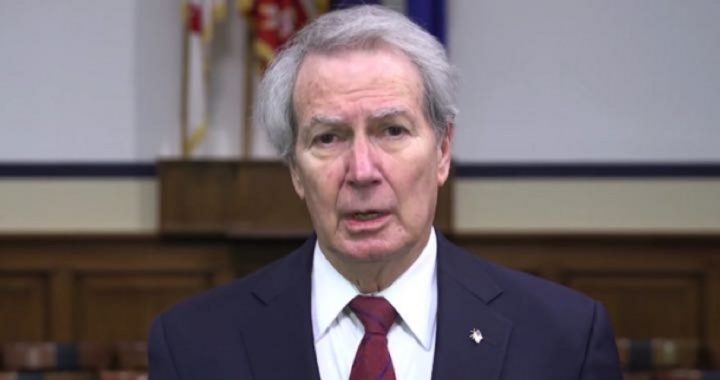
Representative Walter Jones (R-N.C.), the congressman best known for going from a vocal Iraq War supporter to an even more vocal opponent, died Sunday, his 76th birthday, after an extended illness.
Jones, who had just begun his 13th term in the House of Representatives, was a fairly reliable constitutionalist, with a lifetime score of 81 percent on The New American’s Freedom Index. He generally opposed big government and, as a devout Catholic, fought against abortion and same-sex “marriage,” calling the latter “an assault on the Judeo-Christian values upon which this country was founded.” His most common failures to uphold the Constitution occurred in the areas of farm subsidies and, until 2003, foreign policy — understandable, though not excusable, mistakes in light of the fact that his district was largely agricultural and included several military installations.
Despite misgivings, Jones bowed to political pressure and voted in favor of the 2002 resolution authorizing the U.S. invasion of Iraq.
“When I went to the floor of the House to give the president the authority to go into Iraq, I did not feel that the briefing that I had attended had convinced me that there were weapons of mass destruction, and yet I was not strong enough to vote my conscience,” he told Antiwar.com in 2009. “I was thinking of the politics, you know…. You represent a military district and a lot of retired military, so I voted for the resolution.”
Although Jones said he immediately regretted his vote, he nevertheless felt strongly enough about the war to lead the effort to get the House cafeteria to rename French fries “freedom fries” because France had opposed the invasion.
The next year, Jones’ misgivings about the war blossomed into full-fledged opposition to it and similar foreign interventions after he attended the funeral for a Marine who was killed in Iraq. As he sat with the widow and her young son, the reality of the war hit home. “And I felt the guilt, but also the pain of voting to send her husband as well as thousands of other military to a war that was unnecessary,” Jones told the Associated Press in 2017.
Jones wrote a letter of condolence to the widow — the first of more than 11,000 he would send to the families of servicemen killed in U.S. interventions over the next 15 years.
He also began visiting wounded servicemen at Walter Reed National Military Medical Center “to be reminded that war is hell — people die; people get wounded,” he told the University of North Carolina student newspaper in 2017.
Jones became a fierce critic of foreign interventionism under Democratic and Republican presidents alike, opposing U.S. involvement in Libya, Syria, and Yemen and calling for an exit strategy from Afghanistan. “He saw the continuation of open-ended and illegal wars as an attack on the Constitution and an abuse of the men and women who volunteered to serve their country,” wrote the American Conservative’s Daniel Larison. For this — especially his reversal on Iraq — he was pilloried by many of his fellow Republicans; the GOP even tried to unseat him in primaries to no avail.
Still, Jones’ actions earned him the respect of lawmakers on both sides of the aisle.
Representative Justin Amash (R-Mich.) tweeted that Jones was “the most honorable, principled, and courageous person I have known … and a leading voice for peace.”
In a statement, Senator Thom Tillis (R-N.C.) said, “He always did what he felt was right for his constituents, his district, and his country, and it was no wonder why he was so widely admired and trusted.”
North Carolina Governor Roy Cooper, a Democrat, ordered all flags at state facilities to be flown at half-staff in Jones’ memory, saying the late congressman “was a public servant who was true to his convictions and who will be missed.”
While Jones would no doubt be gratified to hear the encomia being heaped upon him today, he was far more concerned with what he would hear from someone else upon his passing.
“I didn’t come up here [to Congress] to seek power or to get a chairmanship,” he told Mother Jones in 2006. “I want to do what I think my Lord wants me to do.”
Image of Walter Jones: Screenshot from Jones’ Facebook page



